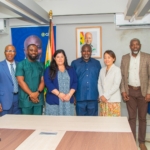
The Ghana Revenue Authority (GRA) has launched the Govtech Innovation Challenge, a programme aimed at developing innovative digital solutions to enhance effective tax administration.
The initiative led by the Word Bank in collaboration with the Swiss State Secretariat for Economic Affairs (SECO), and Trust Valley is designed to connect government partners with technology companies to address critical public sector challenges.
Addressing officials from a delegations from the World Bank, SECO and Trust Valley, Commissioner General of the GRA, Anthony Kwasi Sarpong said the ‘Challenge’ aims to mobilise startups and SMEs to develop practical solutions that enhance efficiency, transparency and citizen services through digital transformation.
He said the ‘Challenge’ focuses on improving tax resource mobilization in Ghana by creating simple, smart tax solutions for the GRA.
“This initiative is expected to help us to achieve our expected target of mobilizing GH¢360 billion revenue by the year 2028”.
“This Innovation Challenge offers the GRA a great opportunity to improve revenue mobilization with efficiency, specifically focusing on the informal economy.
Already, numerous startups from the digital community have approached the Authority to participate in this novel programme,” Mr Sarpong noted.
A Senior Public Sector Specialist & Task Team Lead at the World Bank, Shiho Nagaki, said the initiative aims to bring tech companies into the country for this Challenge, stressing that Ghana remains a priority country for the World Bank and SECO, in matters of revenue mobilization and development.
Nagaki explained that participants in the Challenge will have the opportunity to co-design and pilot a digital solution to fix a real-world government issues, access to executive-level training in Switzerland, be awarded with a prize and recognition, global exposure through the World Bank’s platform and access to Trust Valley ecosystem.
Announcing the criteria and timelines for the Challenge, the Chief Executive Officer of Trust Valley, Lennig Pedron explained that participating enterprises must be early-stage startups, scale-ups, and SMEs that are legally incorporated and have fewer than 75 staff, and generate less than US$5 million in annual revenue.
